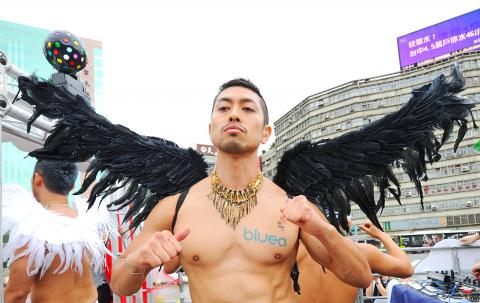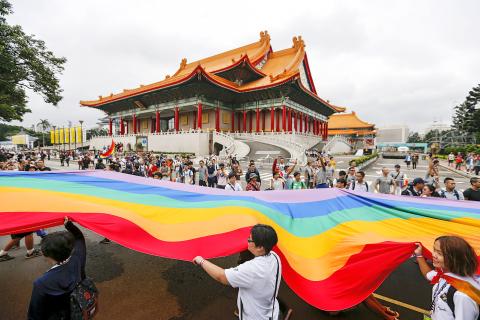Thousands of people yesterday took to Taipei’s streets to support the 14th annual Taiwan lesbian, gay, bisexual and transgender (LGBT) Pride Parade.
Braving rainy weather, the crowd congregated on Ketagalan Boulevard before standard bearers joined the crowd with a large rainbow banner to lead the parade.
Participants in ordinary clothing brushed shoulders with those dressed up in outlandish costumes and radiant colors. Some portrayed anime characters while others dressed up as princesses.

Photo: CNA
Promenaders ambled along Renai and Xinyi roads, covering the areas between Zhongshan S and Xinsheng S roads, before heading in opposite directions on Xinsheng S Road and returning to the stage.
The themes of this year’s parade were “Fun together” and “Honor diversity, like you mean it,” meaning that the goal is to break through “fake friendliness,” or gestures that are actually discriminatory toward people of differing sexual orientations, including lesbians, gays, bisexuals, transgender people, intersexuals, queers and asexuals.
Event organizers called on legislators across party lines to pass a proposed amendment to the Civil Code to legalize same-sex marriage and urged participants to assist by making telephone calls to legislators in their constituencies who have not signed petitions to endorse the proposed amendment.

Photo: CNA
An American who identified himself as Prent said he came from Taichung to support the event.
Prent said he heard about Taiwan’s reputation as a gay-friendly nation while working in China and decided to move to Taiwan.
“It would be amazing if the legislature passes the amendment to become the first Asian nation to legalize same-sex marriage, as it would likely inspire other Asian nations to follow suit and put Taiwan on par with Western democracies that have already done so,” he said.

Photo: EPA
Shu Kuge and Jared Braiterman, a gay couple living in Tokyo, said they came to Taipei just for the parade.
A number of Japanese attended yesterday’s parade, Kuge said, adding the Taiwan LGBT Pride Parade is the biggest event of its kind in Asia and is well-known in Japan.
Kuge said the Taiwanese government seems more supportive of same-sex marriage than the Japanese government, so it would be “exciting” if bills regarding same-sex marriage are passed, as it would likely set an example for Japan.

Photo: CNA
While foreigners praised the nation’s friendliness toward homosexual people, a number of Taiwanese who attended the parade declined to be interviewed or reveal their first names.
A Taiwanese surnamed Wu (吳) said he had not made public that he is gay, because he believed Asians, especially older people, tend to be more conservative and unwelcoming to homosexuality.
A promenader who identified himself as Da Mao (大毛) said he would like to be married to his partner someday, but that he is worried that his parents and older relatives might not approve.
He said that society has come a long way in terms of friendliness toward homosexual people and he has not had to deal with discriminatory labels that were attached to him when he was younger.
However, some people still do not accept gay people, particularly those involved in intimate relationships, which means there is still room for improvement before society can truly bring down the barriers between people of different sexual orientations, he said.

A Ministry of Foreign Affairs official yesterday said that a delegation that visited China for an APEC meeting did not receive any kind of treatment that downgraded Taiwan’s sovereignty. Department of International Organizations Director-General Jonathan Sun (孫儉元) said that he and a group of ministry officials visited Shenzhen, China, to attend the APEC Informal Senior Officials’ Meeting last month. The trip went “smoothly and safely” for all Taiwanese delegates, as the Chinese side arranged the trip in accordance with long-standing practices, Sun said at the ministry’s weekly briefing. The Taiwanese group did not encounter any political suppression, he said. Sun made the remarks when

The Taiwanese passport ranked 33rd in a global listing of passports by convenience this month, rising three places from last month’s ranking, but matching its position in January last year. The Henley Passport Index, an international ranking of passports by the number of designations its holder can travel to without a visa, showed that the Taiwan passport enables holders to travel to 139 countries and territories without a visa. Singapore’s passport was ranked the most powerful with visa-free access to 192 destinations out of 227, according to the index published on Tuesday by UK-based migration investment consultancy firm Henley and Partners. Japan’s and

BROAD AGREEMENT: The two are nearing a trade deal to reduce Taiwan’s tariff to 15% and a commitment for TSMC to build five more fabs, a ‘New York Times’ report said Taiwan and the US have reached a broad consensus on a trade deal, the Executive Yuan’s Office of Trade Negotiations said yesterday, after a report said that Washington is set to reduce Taiwan’s tariff rate to 15 percent. The New York Times on Monday reported that the two nations are nearing a trade deal to reduce Taiwan’s tariff rate to 15 percent and commit Taiwan Semiconductor Manufacturing Co (TSMC, 台積電) to building at least five more facilities in the US. “The agreement, which has been under negotiation for months, is being legally scrubbed and could be announced this month,” the paper said,

MIXED SOURCING: While Taiwan is expanding domestic production, it also sources munitions overseas, as some, like M855 rounds, are cheaper than locally made ones Taiwan and the US plan to jointly produce 155mm artillery shells, as the munition is in high demand due to the Ukraine-Russia war and should be useful in Taiwan’s self-defense, Armaments Bureau Director-General Lieutenant General Lin Wen-hsiang (林文祥) told lawmakers in Taipei yesterday. Lin was responding to questions about Taiwan’s partnership with allies in producing munitions at a meeting of the legislature’s Foreign Affairs and National Defense Committee. Given the intense demand for 155mm artillery shells in Ukraine’s defense against the Russian invasion, and in light of Taiwan’s own defensive needs, Taipei and Washington plan to jointly produce 155mm shells, said Lin,